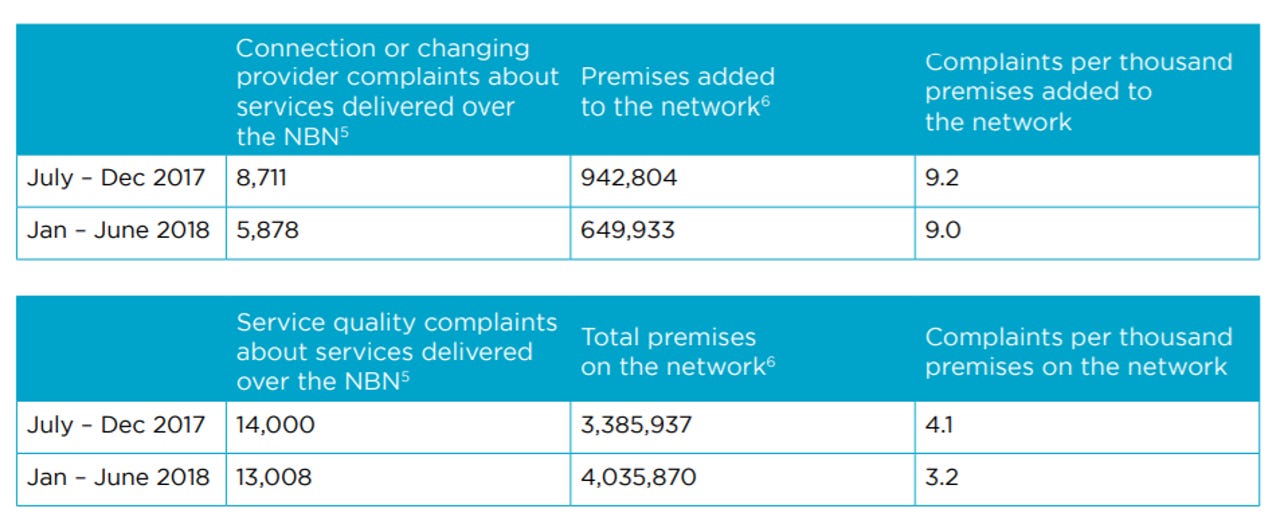Telco complaints 'turning the corner': TIO


While complaints to the Telecommunications Industry Ombudsman (TIO) were up marginally for the year, they began dropping in the final quarter including across the National Broadband Network (NBN), the 2018 annual report has revealed.
Complaints increased by 6.2 percent year on year, but dropped by 17.8 percent quarter on quarter in Q4.
"I am pleased to report that the number of complaints about telecommunications services in Australia appear to be turning the corner, with complaints trending down in the latter part of the year," Ombudsman Judi Jones said on Wednesday.
The decrease in complaints follows government action after NBN complaints previously tripled, Jones added, pointing to the Australian Competition and Consumer Commission (ACCC)'s speed monitoring reports and repercussions for retailers not delivering on their speed promises, with Telstra, Optus, TPG, iiNet, Internode, Dodo, iPrimus, and Commander all having been forced to compensate tens of thousands of customers.
The TIO also attributed the complaints drop to Communications Minister Mitch Fifield's roundtable with NBN and retailers; the Australian Communications and Media Authority (ACMA)'s new migration rules; NBN's wholesale pricing changes; and the TIO's own complaints-handling changes.
"I have consistently said the increase in complaints to my office over the last two years has not solely been driven by the rollout of the National Broadband Network," Jones added.
"Complaints had increased in all service types, and it is pleasing to see complaints have started to decline across the board. Our new Responsive Complaints Service (commencing on 1 July 2018) is more flexible, is designed to get to the heart of each complaint more quickly, and focuses on resolution."
For the year to June 30, the TIO received 167,831 complaints in total, with 146,958 from consumers and 20,433 from small business.
Mobile phone services made up 51,328 complaints; multiple services accounted for 49,875 complaints; internet services caused 46,703 complaints; landline phone services 18,736 complaints; and property 1,189 complaints.
For complaint types, customer service made up the most complaints, at 40 percent overall, followed by payment for a service at 36 percent; service delivery at 31 percent; establishing a service at 20.5 percent; and property at 1 percent.
Of all complaints about service quality, 47 percent were about services being delivered over the NBN, at 27,008 complaints; and of all connection and changing provider complaints, 58 percent were about NBN services, at 14,589.
However, these both dropped during the second half of the financial year despite more premises being activated, the TIO said.
Connection or changing provider complaints numbered 8,711 in July to December 2017, or 9.2 per thousand premises added to the NBN, and numbered 5,878 or nine per thousand premises added to the NBN for January to June 2018.
Service quality complaints dropped from 14,000 or 4.1 per thousand premises on the network from July to December 2017 down to 13,008 or 3.2 per thousand premises on the network from January to June 2018.
MyRepublic saw the steepest rise in complaints, up 102 percent from last year to 1,816 complaints to the Ombudsman during FY18. It was followed by Optus including Virgin Mobile, which saw complaints jump by 35 percent to 40,665; and Telstra, up by 7.7 percent during the year for a total of 82,528 complaints.
Southern Phone experienced the biggest decrease in complaints, down 28 percent to 1,484, followed by iiNet, which was down 24 percent to 7,719; TPG, down 11 percent to 6,248; Vodafone Australia, down 8.7 percent to 9,752; M2 Commander, down 8.2 percent to 1,565; and Dodo, down 5.7 percent to 3,120 complaints to the Ombudsman during FY18.
Primus remained relatively stagnant, up 0.1 percent to 1,918 complaints for the financial year.
Across the states, New South Wales clocked the most complaints, up 5 percent from last year to 52,989 complaints; Victoria was up 9 percent to 47,620 complaints; Queensland was up 13 percent to 32,820 complaints; Western Australia was up 11 percent to 15,075 complaints; South Australia was up 1 percent to 12,667 complaints; Tasmania was up 0.7 percent to 2,986 complaints; the Australian Capital Territory was down 5.6 percent to 2,466 complaints; and the Northern Territory was down 0.1 percent to 1,042 complaints.
Overall, the TIO commenced 17,236 conciliations during the year, with 88 percent of online complaints processed the same day; 52 possible systemic issues notified to providers; and 30 systemic matters resulting in the retailer agreeing to or making changes to their systems and processes.
While acknowledging the slight improvement in Q4, the Australian Communications Consumer Action Network (ACCAN) said it is "frustrated" with the TIO complaints increase.
"Although the last quarter has shown improvement, this is the third year in a row that the complaint numbers have climbed," ACCAN CEO Teresa Corbin said.
"It is time to draw a line in the sand -- consumers deserve better from their telco providers."
Recent NBN Coverage
- Economics now the 'main game' for NBN: Rowland
- AdTran upgrades G.fast technology to 2Gbps speeds
- Optus leverages NBN for regional mobile network expansion
- ACMA finds Telstra failed to help customers with life-threatening medical conditions
- Streaming media policy (Tech Pro Research)
- Western Tasmania gains fibre broadband under NBN tech choice program
- Aussie Broadband forced to shelve lower-priced services after NBN pricing changes
- NBN: 1,500 fixed-wireless users download over 1TB in a month
- Aussie Broadband properly explains broadband outage to customers
- MacTel signs AU$1m NBN deal with Regional Australia Bank
- NBN upgrades transit network to 19.2Tbps per fibre link
- Telstra drops FY19 guidance by AU$300m due to NBN Corporate Plan